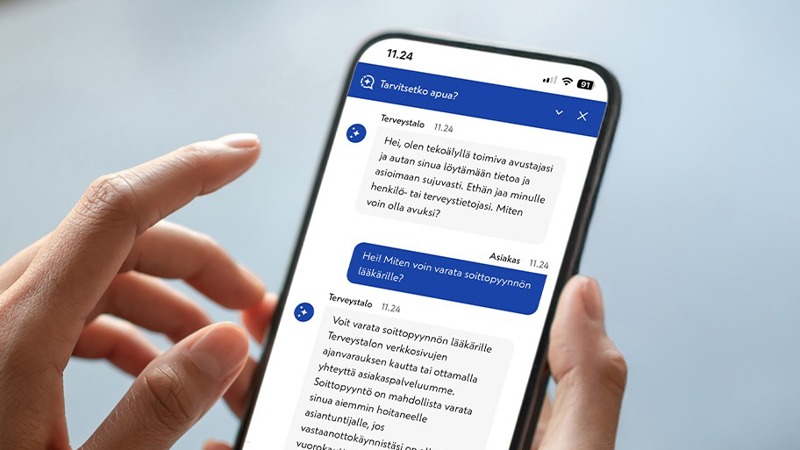Back to work – great! Returning to work should not cause anxiety
It is time to return to work, but there is no reason to worry. When your vacation is coming to an end, you may feel a little wistful, but returning to work should not cause anxiety. At best, returning to work brings a lot of joy to life. An occupational psychologist reveals how to make returning to work easy and fun.

Returning to work feels exasperating, and worry and restlessness fill the mind as the vacation draws to a close. Is this really the case? According to Terveystalo’s Chief Occupational Psychologist Antti Aro, the whole concept of return-to-work stress is a myth.
“For the majority of people, returning from vacation is not particularly stressful – often you return to a familiar place and do the same things as before the vacation. Many people actually find it positive that they can return to their daily routines,” emphasizes Aro.
If you have had a really good vacation, it is only natural that there may be feelings of longing associated with its end. However, returning to work should not cause anxiety.
What is it that bugs you about returning to work?
When returning to work feels bad, there is probably something wrong at work. The disturbing things can be avoided on vacation, but the same problems are still waiting at the workplace.
“Getting started is always difficult. Returning to work is a situation of change that takes time to get used to. If even the thought of going to the workplace causes stress, you should think about whether everything is okay. Do I like my job? When you return from vacation, you often look at your everyday life with new eyes,” says Aro.
On vacation, working memory resets effectively, and acute work-related issues disappear from the mind. When the vacation is coming to an end, it is especially common for people who do information work to worry about whether they will remember where they left off before the vacation.
“Returning from vacation can be made easier by storing important information in a safe place before going on vacation. It is a good idea to write down what you were working on and what you left unfinished. When returning to work, stress decreases when you can take out your notes and continue where you left off,” says Aro.
Get down to challenging tasks right away
It is often said that you should start working gradually after a vacation. However, Aro disagrees:
“Adults are not like first graders – a brisk start is better in many ways. Wandering around the workplace only creates more stress. The sooner you can start working on something exciting, the easier it will be to return to work,” he emphasizes.
The most important thing is to properly schedule the vacations so that there are not too many expectations loaded into a single vacation. According to Aro, as a rule of thumb, three weeks is enough to break away from the busyness of work, but even a few vacation days can be enough to recover:
“The length of the vacation does not really affect its restoring effect. It is more important to think about what you do on vacation. If you can effectively get your thoughts off work, a long weekend can serve as a good break from time to time.”
5 tips for returning to work:
- Be positive.As simple as it sounds, returning to work becomes easier when you approach it in a positive light.
- Get your sleep rhythm in order before starting work.If your daily rhythm on vacation is very different from regular working weekdays, bedtimes may need to be adjusted. You should start adjusting your rhythm a few days before the end of the vacation, so you will feel more refreshed when work starts.
- Get started efficiently.Starting slowly will not make returning to work any easier. You should jump straight into challenging tasks so that you can get up to speed with the work right away. Memorizing passwords and tasks makes it easier to get back to work.
- Catch up with colleagues.Casual catching up helps to tune into the same wavelength with colleagues. Shared enthusiasm creates team spirit and makes working as a team easier.
- Schedule the vacations.You should not expect to be relaxed enough for the whole year with only one long vacation. When possible, schedule the vacations so that you can have a few extended weekends in addition to a longer consecutive vacation. This is when the restorative effect of the vacation is at its greatest, and going on vacation and returning to work will not feel too overwhelming.
Latest articles

What is metabolic age and why should you care about it?
A new laboratory study by Terveystalo reveals how your body is aging. Metabolic age makes biological aging visible.

Smooth assistance for your needs – our AI assistant is now at your service
You can now find Terveystalo’s AI assistant on our website — a quick and easy way to get answers based on the information available on our site. For now, the assistant is available only on the Finnish‑language section of our website, but you can chat with it in English.

How technology helps relieve mental stress: "When the load is high, the threshold must be low."
Mental health disorders have overtaken musculoskeletal disorders, which had long been the leading cause of sick leave. Work is changing, and the range of sick leave caused by mental health issues has also changed. We must be able to offer new solutions to this challenge.

Extensive data set of 200,000 samples: Nightingale study reveals link between illness risks and sick leave
Data from the Finnish Nightingale study, which is used in Terveystalo's occupational health services, reveals a clear link between lifestyle-related health risks and sick leave. The exceptionally extensive data set of over 200,000 customers shows that people with a low risk of illness had significantly fewer absences, while those in high-risk groups had more absences. The results highlight the importance of preventive healthcare in ensuring work ability and the competitiveness of companies.

Strong identification speeds up your service experience when calling us
Soon you can identify yourself easily and securely before your call is answered. Read below to see how the identification process works.

Terveystalo's digital services have been awarded the internationally recognized ISO27001 information security certification.
Terveystalo's information security practices, processes, and risk management are in line with international best practices.